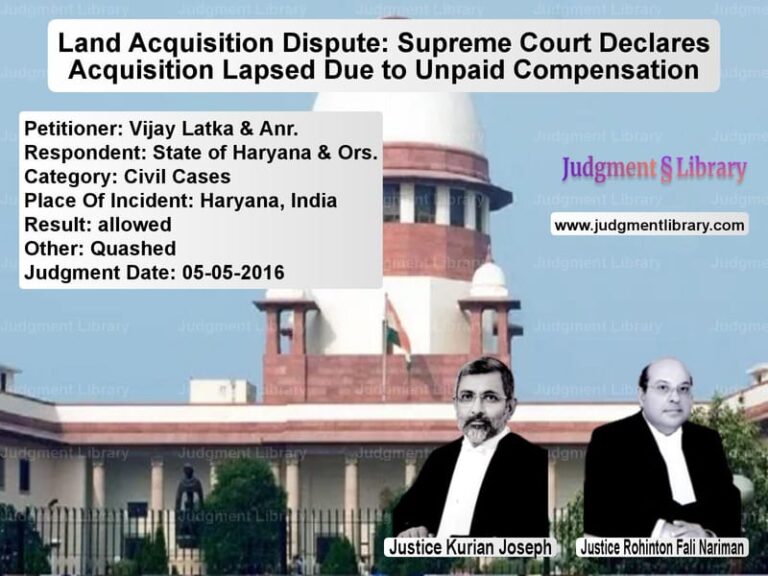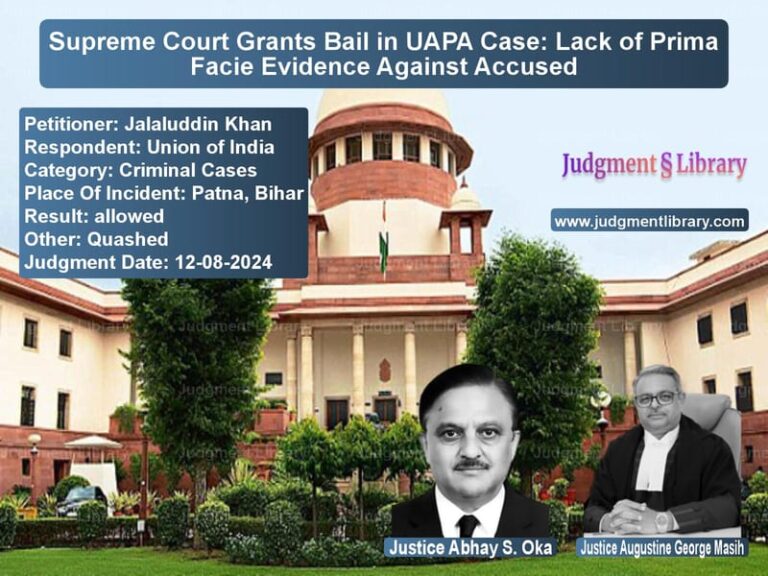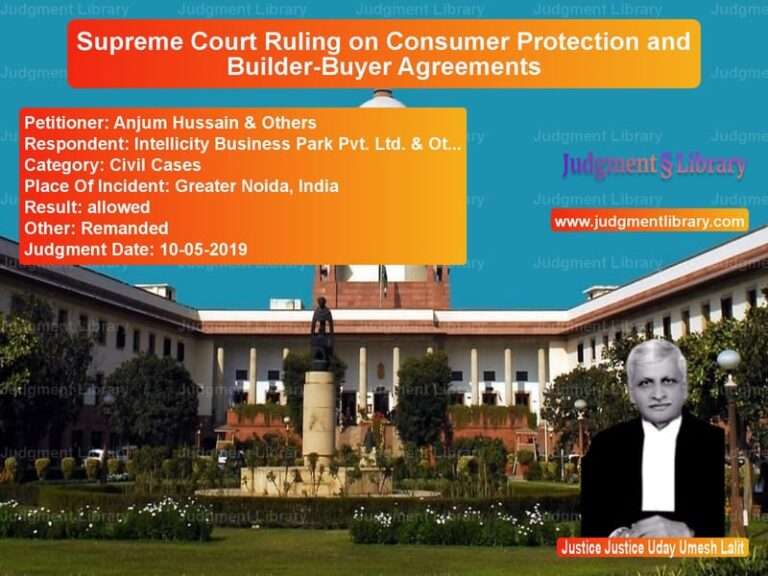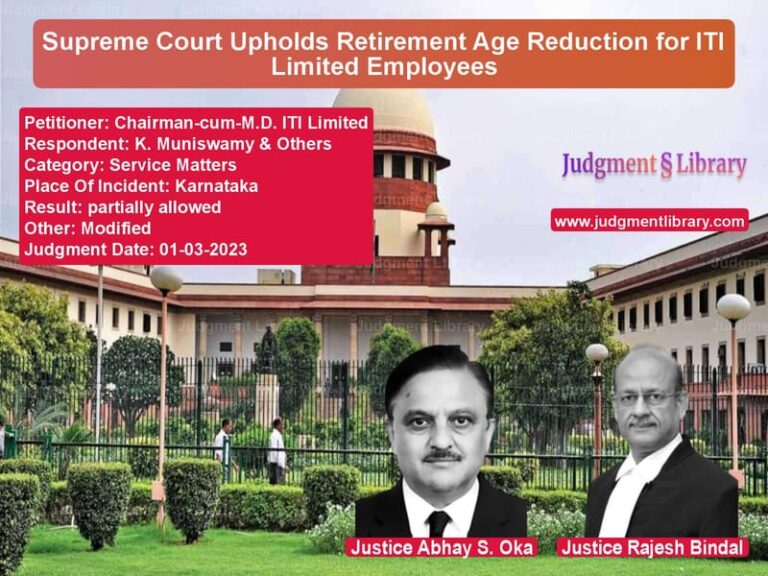Supreme Court Upholds Corruption Conviction in Bhima Razu Prasad Case
The Supreme Court of India has upheld the conviction of Bhima Razu Prasad, a former Regional Manager of Rashtriya Ispat Nigam Ltd., along with co-accused V.S. Krishnan and Murugesan, for offenses under the Prevention of Corruption Act, 1988 and the Indian Penal Code (IPC). The case revolved around allegations of disproportionate assets and fabricated evidence intended to mislead investigators.
Background of the Case
The case originated in 2001 when the Central Bureau of Investigation (CBI) registered a case against Bhima Razu Prasad under Sections 120B (criminal conspiracy), 420 (cheating), 467, 468, and 471 (forgery) of the IPC, along with Sections 13(2) and 13(1)(d) of the Prevention of Corruption Act. The investigation revealed that Prasad was in possession of assets disproportionate to his known sources of income.
During a raid conducted on January 24, 2001, CBI officers recovered Rs. 79,65,900 in cash, along with jewelry and property documents, from his residence. Given that these assets were far beyond his known income, a separate case under Section 13(2) read with Section 13(1)(e) of the Prevention of Corruption Act was registered against him.
Fabrication of Evidence by Co-Accused
Subsequently, the co-accused V.S. Krishnan and Murugesan claimed that the seized cash did not belong to Prasad. They alleged that Krishnan had entered into a sale agreement with Murugesan on January 24, 2001, for which Rs. 80 lakhs was to be paid in advance. Since Krishnan was unavailable on that date, he allegedly entrusted the money and a duplicate agreement copy to Prasad for safekeeping.
The accused presented this explanation to the CBI through a letter dated February 4, 2002. They also submitted a purported sale deed along with account books to justify the transaction. However, upon verification, the CBI found inconsistencies, including:
- The market value of the property in question was significantly lower than Rs. 80 lakhs.
- One of the properties was already mortgaged to a bank since 1998.
- The stamp vendor through whom the sale deed was issued had lost his license in 1992, raising questions about the authenticity of the document.
As a result, the authorities concluded that the accused had fabricated the documents to mislead the investigation.
Trial Court Proceedings and Conviction
The case was tried before the Special CBI Court, Chennai. The court found that Prasad, along with Krishnan and Murugesan, had conspired to fabricate evidence in an attempt to recover the seized money and obstruct the investigation.
The court convicted:
- Bhima Razu Prasad under Section 13(2) read with Section 13(1)(e) of the Prevention of Corruption Act and Sections 120B and 193 of the IPC.
- Krishnan and Murugesan under Sections 120B and 193 of the IPC.
Prasad was sentenced to two years of rigorous imprisonment and fined Rs. 1.5 lakhs, while Krishnan and Murugesan received one-year imprisonment terms and fines of Rs. 1 lakh each.
High Court Appeal and Verdict
The accused appealed the conviction in the Madras High Court, arguing that:
- The sale agreement was genuine and the money did not belong to Prasad.
- The trial court erred in convicting them under Section 193 (false evidence) without a formal complaint from the court under Section 195(1)(b)(i) of the CrPC.
The High Court rejected these arguments, affirming that:
- The accused had fabricated documents during the investigation, which does not fall under the protection of Section 195 CrPC.
- The stamp paper used in the alleged sale deed was fraudulent.
- Given the delay in raising the claim about the escrow transaction, the story was not credible.
The High Court upheld the conviction but reduced the sentence, citing the advanced age of the accused.
Supreme Court Observations and Final Ruling
On appeal, the Supreme Court examined whether a complaint under Section 195 CrPC was required before convicting the accused under Section 193 IPC. The Court observed:
“Where an individual fabricates evidence during an investigation with the intent to mislead authorities, such an offense is distinct from fabricating evidence in a court proceeding. The bar under Section 195 CrPC does not apply.”
The Court ruled that the investigative agency had the right to prosecute without a prior court complaint, emphasizing that fabricated evidence during an investigation does not qualify as being ‘in relation to’ a court proceeding under Section 195(1)(b)(i) of CrPC.
In conclusion, the Supreme Court:
- Dismissed the appeals, affirming the convictions.
- Maintained the reduced sentence granted by the High Court.
- Ordered the accused to surrender within two weeks to serve their remaining sentences.
Impact of the Judgment
This ruling reinforces the following legal principles:
- Fabricating evidence during an investigation is a serious offense: Individuals attempting to mislead investigators cannot claim protection under Section 195 CrPC.
- Prevention of Corruption Act applies to disproportionate assets: Even indirect attempts to conceal wealth can lead to serious penalties.
- Investigative agencies have the authority to prosecute: Courts have affirmed the power of agencies like the CBI to take action against fraudulent claims and fabricated documents.
The verdict serves as a precedent in corruption cases, ensuring that individuals in positions of power cannot evade justice through fabricated evidence.
Petitioner Name: Bhima Razu Prasad.Respondent Name: State, represented by Deputy Superintendent of Police, CBI/SPE/ACU-II.Judgment By: Justice Mohan M. Shantanagoudar, Justice Vineet Saran.Place Of Incident: Chennai, Tamil Nadu.Judgment Date: 12-03-2021.
Don’t miss out on the full details! Download the complete judgment in PDF format below and gain valuable insights instantly!
Download Judgment: bhima-razu-prasad-vs-state,-represented-b-supreme-court-of-india-judgment-dated-12-03-2021.pdf
Directly Download Judgment: Directly download this Judgment
See all petitions in Fraud and Forgery
See all petitions in Money Laundering Cases
See all petitions in Bail and Anticipatory Bail
See all petitions in Judgment by Mohan M. Shantanagoudar
See all petitions in Judgment by Vineet Saran
See all petitions in dismissed
See all petitions in supreme court of India judgments March 2021
See all petitions in 2021 judgments
See all posts in Criminal Cases Category
See all allowed petitions in Criminal Cases Category
See all Dismissed petitions in Criminal Cases Category
See all partially allowed petitions in Criminal Cases Category







